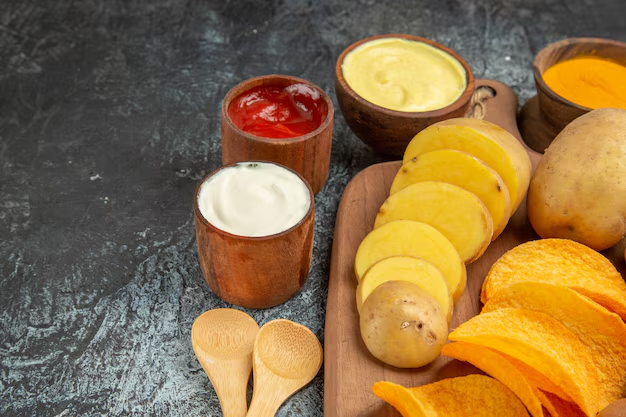Is It Time to Move Ketchup from the Counter to the Fridge?
When it comes to food storage, few topics are as hotly debated as whether ketchup should be kept in the refrigerator. This seemingly simple question has sparked countless debates around dinner tables. As we delve into the world of ketchup storage, you'll gain clarity on more than just the best place to store your favorite condiment; you'll uncover insights into food safety, shelf life, and the factors impacting food quality.
The Basics of Ketchup Composition
Understanding whether to refrigerate ketchup starts with what ketchup is made of. This beloved condiment typically contains:
- Tomatoes: The primary ingredient, offering acidity.
- Vinegar: Adds to the acidity, essential for preservation.
- Sugar: Contributes sweetness and some preservative properties.
- Spices and Salt: Enhance flavor while providing additional preservation qualities.
The presence of vinegar and tomatoes means ketchup already has a fairly high level of acidity, which deters bacterial growth. This feature makes ketchup relatively shelf-stable compared to many other condiments.
To Refrigerate or Not: The Case for Room Temperature
Arguments for Room Temperature Storage
Stability Through Acid: The natural acidity helps prolong the condiment's life, similar to how pickling works.
Flavor Profile: Many argue that ketchup tastes better at room temperature, enhancing its flavor when topping hot food items like fries and burgers.
Convenience: For those without ample fridge space, keeping ketchup on the counter allows easy access.
Consumer Experiences
Observations show that ketchup left at room temperature remains similar in taste and texture over weeks. Regular consumers often note that as long as the bottle is airtight, spoilage is rare.
The Case for Refrigeration
Why Some Opt for the Fridge
Extended Freshness: Refrigeration can preserve the quality, flavor, and color, especially after opening.
Safety Assurance: Keeping the bottle cool ensures maximum safety against spoilage over extended periods.
Common Practice: Refrigerating condiments is standard in many households, driven by long-established habits.
What Experts Suggest
Many chefs and food safety experts incline towards refrigerating once opened due to its extended shelf life benefits and minimized spoilage risk. This recommendation particularly applies to those who consume ketchup less frequently.
Understanding Storage Guidelines
Best Storage Practices
- Before Opening: Ketchup can be stored safely in a cool, dry place away from sunlight.
- After Opening: Even if you leave it out temporarily, returning it to the refrigerator can ensure quality preservation for a more extended period.
Shelf Life Summary
- Unopened Ketchup: Typically safe for storage at room temperature for up to a year. Check the "Best By" date for guidance.
- Opened Ketchup at Room Temp: Flavor remains consistent for up to a month.
- Refrigerated Ketchup: Maintains flavor and color for six months or more after opening.
Table of Storage Outcomes
| Condition | Room Temperature | Refrigeration |
|---|---|---|
| Opened Duration | Up to 1 month (quality check) | 6 months (optimal quality preservation) |
| Flavor | Remains consistent, easier pour | Fresher, but slightly thicker pour |
| Color & Clarity | Possible risk of slight separation | Stable color, minimal separation |
Practical Tips for Consumers
Ensuring Your Ketchup Stays Fresh
- Check the Seal: Ensure the cap is tightly closed to maintain freshness.
- Avoid Cross-Contamination: Avoid direct contact with foods or utensils that might introduce bacteria.
- Quality Checks: If ketchup changes in smell, color, or texture, it's time to consider disposal.
Quick Overview with Emojis
- 🕒 Time: Keep it cool for longer freshness.
- 👀 Eyes on Safety: Trust your senses; any off-smells or unexpected textures are a red flag.
- 🚫 Limit Risks: Apply a clean squirt, avoid dipping directly!
Beyond Ketchup: Considering Similar Condiments
Ketchup isn't alone when it comes to storage debates. Let's take a brief look at how other common condiments stack up in terms of storage needs:
- Mustard: Often stored with ketchup, both in and out of the fridge. Its acidity offers similar preservative properties.
- Mayonnaise: Requires refrigeration after opening due to its egg content.
- Soy Sauce: Typically shelf-stable due to high salt content, but refrigeration can preserve its flavor longer after opening.
Bringing It All Together
Whether you choose to refrigerate your ketchup or keep it at room temperature often boils down to personal preference and consumption habits. The debate highlights broader concerns about food storage and safety, encouraging consumers to make more informed choices based on their specific needs and circumstances.
By considering the principles of acidity, preservation, and personal usage patterns, you can make a confident decision that ensures both satisfaction and safety. Remember, precise conditions and usage will inevitably influence the best practices, so keep an eye on how your food looks and tastes over time.
In examining ketchup storage practices, we unveil a larger conversation about culinary choices and their impacts on shelf life and food enjoyment. Ultimately, the answer to where your ketchup should go resides on how you wish to best enjoy each memorable bite. 🍅

